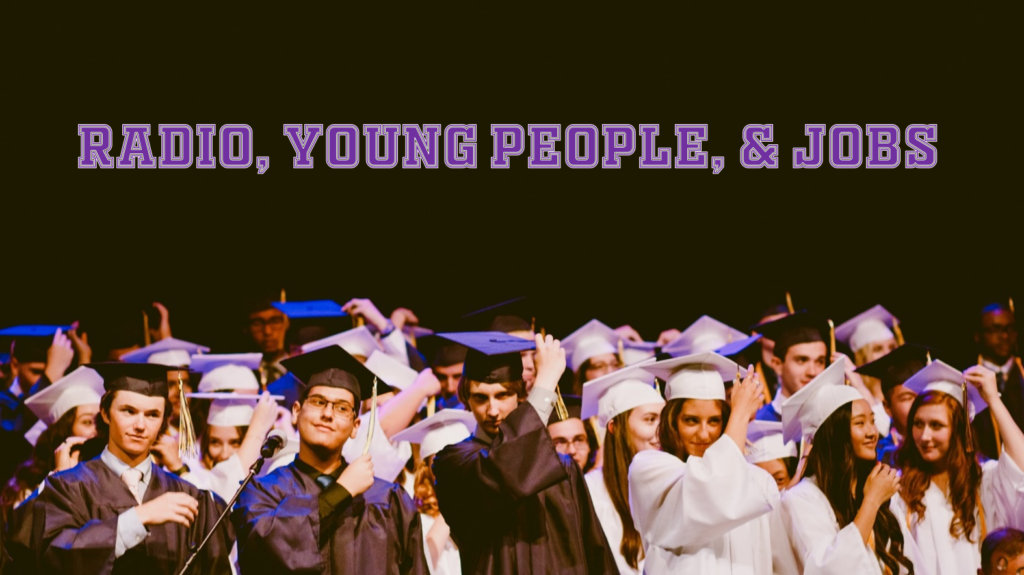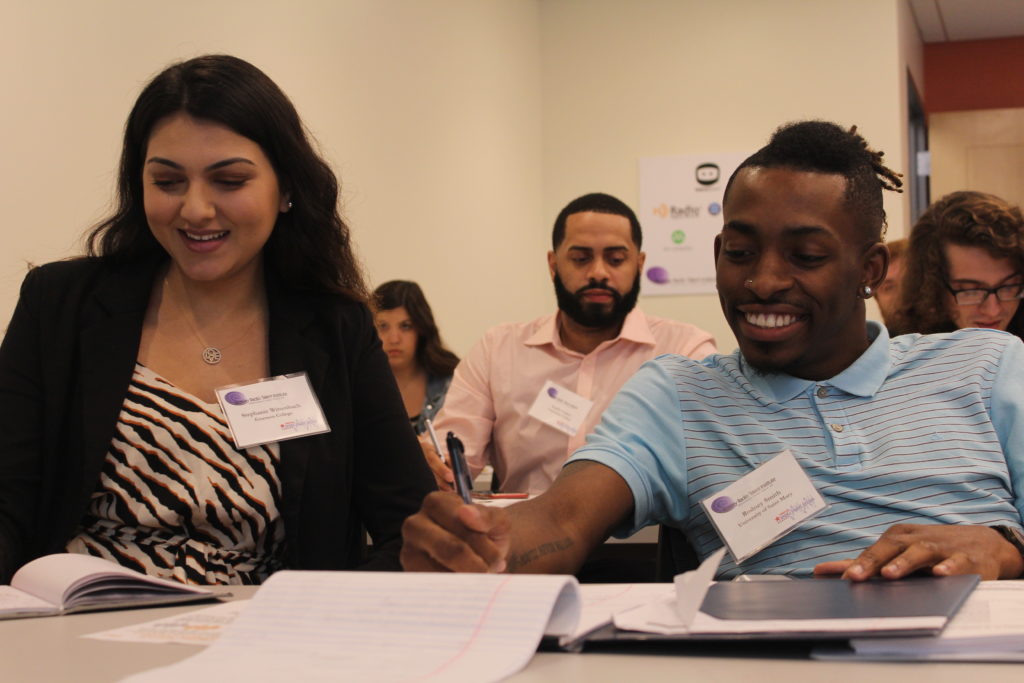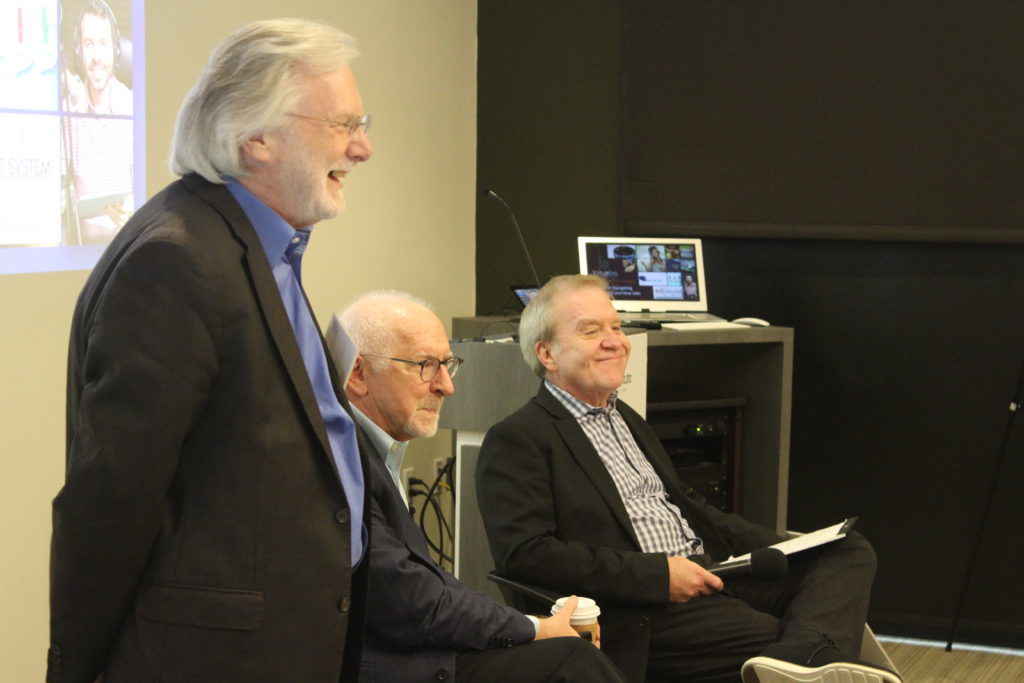
Last week, I had the honor of once again speaking at Dan Vallie’s National Radio Talent Institute program, this time at Emerson College in Boston. Beasley Media sponsors this amazing program where bright, motivated young people come to learn from grizzled, hopeful radio broadcasters from all over the market.
It works.
I met several students who were more than just on the ball. They were excited, pumped, and eager to learn from us radio veterans. And as often happens at these events when young people get together with older generations of radio pros, the learning flowed in both directions. I wish everyone in radio could see what I saw at Emerson last week.
Beasley’s Buzz Knight and I enjoyed a conversation with this group – they asked us questions and we turned right around and pumped them for information. I believe each of us learned a lot from one another – and where radio has been and where it may be headed.
The question on all our minds as I sat in that Emerson College classroom was how we “manufacture” thousands more of these kids who are absolutely, positively excited about careers in radio.
It gets more difficult every day, because of the continued bad rap broadcast radio gets from just about everyone. While some has merit, much of it is patently unfair. Sadly, however, the evidence suggests that jobs in radio – and in all of mass media – are becoming more scarce and don’t pay especially well.
it is patently unfair. Sadly, however, the evidence suggests that jobs in radio – and in all of mass media – are becoming more scarce and don’t pay especially well.
Lew and John Dickey echoed that thinking at Conclave a couple days later. When asked about job prospects in radio, they pointed to new opportunities in areas like video, social, and digital. But they also conceded that when industries consolidate, job cuts are inevitable. Given another pending round of deregulation if the NAB gets its way, that trend is likely to continue.
That reality was confirmed last week in a “Hey Tutor” blog post: “College majors with the highest and lowest unemployment rates.”
This isn’t one of those subjective surveys made up of all sorts of weird variables. It’s based on the most recent Bureau of Labor Statistics report. As we know, the overall job picture in the U.S. continues to be a bright one. Unemployment has dropped to new lows, while more Americans are getting college degrees.
Good news, right? That is until they start listing the college majors with the highest rates of unemployed young people.
And you can stop at #1 – mass media degrees.

At more than a percentage point above the next worst major, mass media students are facing industries beset by layoffs and “projected negative career growth.” And that leads the authors to conclude that those who attain degrees in this discipline “might want to look elsewhere for gainful employment.” They suggest advertising and marketing careers as a fallback.
And to make matters worse, the early career mass media average wage is $35K; mid-career salary is only $60K. A philosophy major makes more money.
So, what does this tell us about radio’s future – not just the industry’s ability to attract bright young people, but the need to create content that resonates with Generation Z, encouraging them to enjoy radio?
It suggests broadcasters have a lot of work to do in both areas. A good start is that there’s a college, university, and community college in close proximity to every radio manager reading this post.
Establishing a relationship with these local schools, their administrations, their faculties, and their students should be at the top of the priorities list.  Thankfully, many state broadcaster associations have programs in place to do just that. But they need your continued support because this mission is of paramount importance.
Thankfully, many state broadcaster associations have programs in place to do just that. But they need your continued support because this mission is of paramount importance.
Institutes like Dan Vallie’s need to expand into more markets, and become annual fixtures on the calendar. More and more broadcasters need to engage, participate, and contribute money, time, and expertise to make them happen. Beasley, Hubbard, Kerby Confer, Art Kellar, and a handful of state broadcaster associations – Tennessee, Indiana, Missouri, Georgia – have already stepped up. But the industry needs to be more supportive of these efforts and invest in its future.
It’s not just a good idea to engage and encourage young people seeking careers in broadcasting.
It should be Job One.
For information on Dan Vallie’s National Radio Talent System, contact Dan here.
Thanks to Randy Kabrich for the heads-up on this story.
- Can Radio Afford To Miss The Short Videos Boat? - April 22, 2025
- Media And Technology In 2025: Believe It Or Not! - April 18, 2025
- In Radio, You Just Never Know - April 17, 2025




Dan, Fred, Buzz, Thanks for this outstanding service and connection between broadcasters and students. Radio 110 is a Life Skill. Involved Boomers need to keep it agile, interesting, creative and essential.
And we need to learn from those Gen Zs! Thanks, Clark.
Good on’ ya, Fred. But let me posit that we need to start building a relationship between radio and the next generation well before they get to college. My own connection to the industry began as a grade-schooler, and really took hold in middle school, in a school district that was fortunate to have been able to fund both a pro-grade TV production center and and a closed-circuit radio station. My radio love affair really blossomed in high school, where I worked both at the school’s own closed-circuit radio station and as an intern at one of our local radio stations. That experience allowed me to get a pro gig at a Chicago news/talk station – and the rest, as they say, is history. I say we need to get ‘em when they’re young – VERY young — as we’re doing now in the Clarkstown, NY Central School District through Viking Radio at our South HS, and soon, at Rams Radio in our North HS. Our kids will have all the tools the pros have — and the joy of learning radio at street level right in their own community. Local operators need to support these educational stations with site visits and guest lecturers — and with invitations to shadow pros in programming, news, engineering and sales
Howard, good points all. The younger, the better. By the time they’re 16, too many don’t know what radio is. Thanks for the comment.
We helped build KAKX – a high school station years ago and continue to mentor – and be entertained. Worth checking out. The spirit and attitude are terrific.
https://www.kakx.org/
https://www.facebook.com/kakxfm/
Smart, Tom. A great investment in your community AND your radio station. This support should keep the pipeline flowing. Kudos to you and the Coast staff.